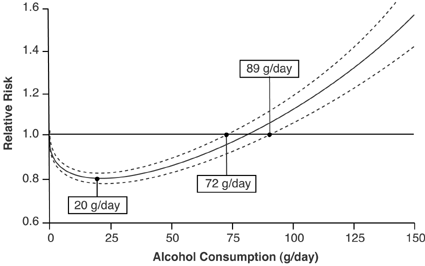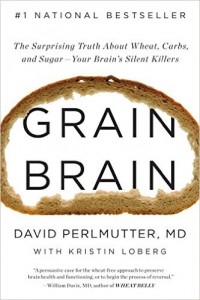Nutrition
More evidence that we’re better off with steak and eggs than cereal for breakfast. With this study from the Journal Nutrition showing that children given a high-protein breakfast are less hungry and burn more fat than those given a high-carb one.
Moderate alcohol consumption continues to show promise for extending lifespan; this time in participants with mild cognitive decline. Considering that alcohol is often blamed for brain damage, these findings from the British Medical Journal are interesting. Especially since those consuming 2-3 drinks per day had a 77% lower risk of death than those consuming none.
A meta-analysis of 21 studies in the American Journal of Clinical Nutrition found a lower risk of dementia and Alzheimer’s in fish eaters (1-serving per week), that continued to decline with each additional serving per week. For non-fish eaters, the researchers saw similar reductions with a DHA-rich omega-3 supplement.
Repeated coffee consumption significantly reduces DNA damage, according to a new study in the journal Molecular Nutrition & Food Research. The researchers saw less DNA strand breaks after a 200mL coffee beverage, followed by further reductions when additional cups were consumed (in 2hr increments up to 8hrs).
Fitness
Evidence from Sweden suggests that ‘fatness’ is more of a problem than a lack of ‘fitness.’ After testing 1.3 million, and ultimately concluding that the risk of early death was higher in aerobically-fit obese individuals than aerobically-unfit lean individuals – by 30%!
Static stretching STILL harms weight-training performance, according to this study from the Journal of Strength & Conditioning Research. As we’ve discussed, and this new evidence suggests, a dynamic warm-up is optimal.
Individuals taking part in aerobic fitness (aka cardio) saw an increase in sedentary behavior, while those taking part in weight-training saw a decrease. What’s interesting, is that the participants taking part in resistance training also increased their non-exercise physical activity by 216kcal/day on non-lifting days.
More evidence that exercise is good for the gut! Increasing the microbial diversity that promotes superior mental and metabolic health.
Lifestyle
New research from the journal Cell Metabolism adds to the case that poor lifestyle choices are passed on to the next generation. With scientists showing major epigenetic differences in the sperm cells of lean and obese men, and over 4,000 structural changes to sperm cell DNA after gastric bypass surgery. Suggesting that Dad’s health is just as important as Mom’s, and reinforcing that our behavior is a critical factor in determining whether or not we produce a healthy baby (and future adult).
Excessive sitting (greater than 7hrs per day) combined with a lack of physical activity (less than 150 minutes per week) produces a 4-fold increase in death risk, according to a recent study in the journal PLOS Medicine. This shouldn’t be a problem for those that have completed the books (or have been following the blog), as we’re already walking 30+ minutes per day and using a sit-to-stand workstation, or taking frequent ‘activity breaks.’
A common complaint is that “a healthy lifestyle is expensive.” But as this study in the Journal of Occupational and Environmental Medicine demonstrates, an unhealthy lifestyle is MORE expensive…for both you and your employer. With researchers from the University of Michigan showing that a healthy employee averages $3,000 in health care costs, while an unhealthy employee (1 medical condition) averages $10,000. Which, in most cases, is eaten up by health issues related to controllable lifestyle factors.
Research from the University of Alabama at Birmingham adds to the evidence that short-sleep makes us crave more and eat more. This time finding that women sleeping less than 7hrs per night engage in more secondary (or mindless) eating and drinking.
Health & Longevity
A high-fat, low-carbohydrate (ketogenic) diet may be useful for treating schizophrenia, according to research from James Cook University. Which shouldn’t come as a surprise, given the connection between ketosis and other diseases of the brain, like epilepsy.
Scientists continue to identify major differences in the gut bacteria of healthy individuals when compared to those that are sick or obese. With this Russian study finding higher levels of Blautia, Serratia, and Akkermansia bacteria in those with diabetes and pre-diabetes. Suggesting that they’re related to our level of glucose tolerance (insulin sensitivity).
ADHD continues to skyrocket in the U.S. With increases of 43% since 2003, and total diagnosis figures sitting at 12% of children and teens. If you have a child with behavioural disorders, try cutting out grains (specifically wheat) and see what happens. There’s no downside and PLENTY of upside.
Back in January of this year (2015), we were told that at least 80% of cancer cases were the result of ‘bad luck.’ However, new evidence in the journal Nature provides evidence that this figure is closer to 10-30%, and extrinsic factors (i.e. behaviour) determine the majority of our risk.
Even ‘slightly’ elevated blood sugar levels are linked to kidney damage according to the American Journal of Kidney Diseases. Which isn’t surprising given what we already know about excess carbohydrates and degenerative conditions, like Non-Alcoholic Fatty Liver Disease.
Looks like Jenny McCarthy was wrong, as mothers with PCOS (polycystic ovarian syndrome), and mother’s taking anti-depressant medication have a much higher risk of having an autistic child. The first study from Sweden was published in the journal Molecular Psychiatry, and showed that pregnant women with PCOS were 59% more likely to bear a child with autism. The scientists believe this is the result of increased androgen levels, which negatively affect the brain and central nervous system of the fetus. Interestingly, the study also found that those with PCOS and excess body fat were at an even higher risk (113%!). The second study, from JAMA Pediatrics, found that pregnant women taking anti-depressants (specifically serotonin reuptake inhibitors) during the 2nd or 3rd trimester were 87% more likely to have a child with autism.
Medication & Supplementation
Statins appear to aggravate exactly what they’re supposed to prevent, atherosclerosis and heart failure. Which begs the question: why are doctors still recommending these? To lower the cholesterol that’s not associated with heart disease…and is essential for a healthy brain?
Fish oil may help prevent fat storage by stimulating energy-burning brown fat. The study was done on mice, but researchers saw fish-oil fed rodents gain 5-10% less weight and 15-25% less fat overall.
There may be a connection between IBS and low vitamin D levels. With this study from the BMJ’s Gastroenterology division finding deficient levels in 82% of IBS sufferers. That being said, the researchers only looked at 51 participants, and vitamin D deficiency is already extremely common in the majority of the population.
High dose vitamin D (10,000IU) is perfectly safe for individuals suffering from Multiple Sclerosis. With evidence from John Hopkins suggesting that it may help regulate the body’s hyperactive immune response, and protect against the higher disability and disease risk associated with lower levels in MS sufferers.
Vitamin A may help protect against cancer growth, by triggering HOXA5 that eliminate cancerous stem cells. Organ meats are the richest source of pre-form vitamin A (retinol), which is better utilized by humans than the provitamin A (carotenoids) found in vegetables. If you don’t consume liver on occasion, a cod liver oil supplement (instead of standard fish oil), or a liver supplement is highly recommended.
New research suggests that Magnesium also has promise for lowering cancer risk. With evidence in the British Journal of Cancer finding a 42% higher risk of pancreatic cancer for those getting 75-99% of the RDA and a 76% higher risk for those getting <75%. Unfortunately, these low levels are extremely common; even in the healthiest diets. So, it adds to the case for making supplementation a necessity.
Stay Lean!
Coach Mike
RELATED ARTICLES:
5 Servings/Day or 1 Serving/Month?
Beyond Live It NOT Diet! - The Wheat-Free Feast
Don't Mess With The Microbes - Gut Bacteria, Obesity & Disease
Why MORE Exercise Fails For Fat Loss - "You cannot outrun a bad diet"




